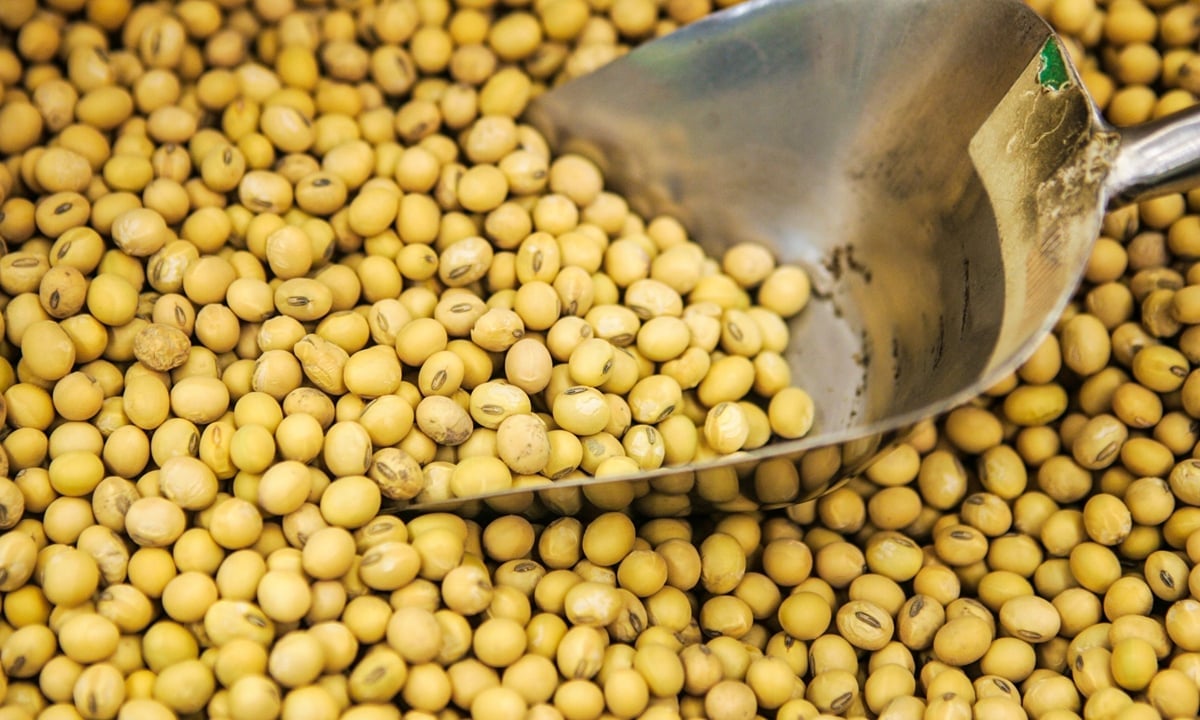May 31, 2025 | 02:35 GMT +7
May 31, 2025 | 02:35 GMT +7
Hotline: 0913.378.918
May 31, 2025 | 02:35 GMT +7
Hotline: 0913.378.918

Soybean. Photo: VCG.
In April, around 40 Brazilian soybean ships are expected to dock at Zhoushan port, Ningbo, East China's Zhejiang Province, a 48 percent year-on-year increase from the 27 shipments recorded in April last year, Yuyuantantian, a social media account affiliated with China Media Group, reported on Monday.
The report citing source said multiple Brazilian soybean vessels have been docking daily at the Laotangshan terminal of Ningbo Zhoushan port in recent days, projecting that the port will unload 700,000 tons of Brazilian soybeans this April, up 32 percent from last year's 530,000 tons.
This is the most direct manifestation of how the tariff confrontation provoked by the U.S. is harming its key industries and ordinary citizens, and it also demonstrates that most of the products China imports from the US can be sufficiently substituted by sourcing from other countries across the globe, a Chinese expert said.
Data from the U.S. Department of Agriculture (USDA) showed that exports of American agricultural products, including soybeans and pork, have been declining sharply. For the period of April 11-17, 2025, this was the first full week of reporting after the U.S.-provoked tariff escalation with China.
Net sales of U.S. soybeans dropped by 50 percent compared to the previous week, while net pork sales plummeted by 72 percent at the same period, per a release the Global Times read at department's official website.
China has reduced its purchases of U.S. soybeans and scaled back the amount of pork it plans to import from the US in 2025. China purchased only 1,800 tons of soybeans in the period, a far cry from the 72,800 tons it purchased in the week ended April 10, the Wall Street Journal (WSJ) reported, citing USDA data on April 24.
USDA data also showed a 12,000-ton reduction in previously announced purchases of U.S. pork by China, cutting total sales for the week ended April 17 to a mere 5,800 tons. That is the lowest figure for 2025 delivery reported so far this year, and it is 72 percent lower than the prior week, the WSJ report said.
It is evident that the U.S. agricultural sector is already suffering from the tariffs, as products like soybeans and pork heavily rely on the Chinese market, Li Yong, a senior research fellow at the China Association of International Trade, told the Global Times on Monday.
"China's vast market and strong purchasing power mean that tariffs have disrupted previously established trade relationships," Li noted.
By instigating a tariff war, the U.S. is voluntarily excluding itself from China's enormous market, according to Li, adding "Despite being a highly competitive supplier in the global market, the tariffs have forced American farmers to lose market share to competitors."
The WSJ cited analysts' predictions that prices for agricultural commodities could come under sharp pressure if this trend continues.Since January, the U.S. has repeatedly imposed tariffs on Chinese goods, deliberately sparking a new round of trade disputes. In response, China swiftly implemented countermeasures. Starting March 10, China imposed a 15 percent tariff on U.S.-origin chicken, wheat, corn, and cotton, and a 10 percent tariff on sorghum, soybeans, pork, beef, seafood, fruits, vegetables, and dairy products.
Li predicts that the US tariffs will lead China to shift toward purchasing more agricultural products from other countries, reducing the US share in the Chinese market.
China has been actively diversifying its agricultural imports in recent years, with Brazil surpassing the US to become its top supplier of soybeans, CCTV reported earlier. Market data revealed that between 2016 and 2024, the US share of China's soybean imports declined from 40 percent to just 18 percent, according to the report.
Industry data showed that China imported 416,000 tons of pork from the US, accounting for 18 percent of its total pork imports last year. In 2024, China was the third-largest pork market for the US, while the US was China's third-largest meat supplier, following Brazil and Argentina.
"Whether for soybeans, pork, or beef, China can find ample substitutes from other agricultural exporters such as Brazil, Argentina, and Australia, whose trade policies are more open than those of the US," Li noted, emphasizing that US tariffs will likely accelerate trade diversion, further strengthening China's cooperation with these countries.
Li urged the US government should recognize the consequences of its tariffs. "Only by lifting all unilateral tariffs can it truly address the challenges faced by its affected industries," Li noted, stressing that protectionism will not achieve the US government's intended goals.
Global Times

(VAN) Vaccinating juvenile pangasius helps reduce disease, antibiotic use, and farming costs, increasing profits for export-oriented farmers in An Giang.

(VAN) Due to a limited supply of workforce and competitive recruitment requirements, businesses struggle to retain talented veterinary human resources.

(VAN) WOAH’s guidance aims to mitigate disease risks through a One Health approach that balances economic, conservation, and public health interests.

(VAN) Ms. Nguyen Thi Dung, Deputy Director of Ngoc Hoang Cooperative, shared about the journey of bringing dragon fruit to Europe, achieving annual revenues in the billions of VND.

(VAN) Bamboo products from Thang Tho Bamboo Cooperative have reached many countries around the world, while also creating jobs for local workers.

(VAN) The Management Board of Con Dao National Park reported that a green sea turtle, tagged in the Philippines, has traveled thousands of kilometers to lay 84 eggs on Bay Canh Islet.

(VAN) Green technology is paving a new path for sustainable aquaculture in the Mekong Delta in particular and across the country in general, helping reduce emissions and adapt to climate change.